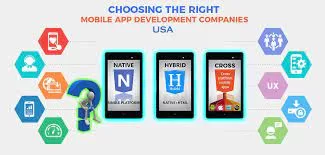The demand for mobile app developers in the USA stemmed primarily from several key factors. First and foremost, the widespread use of smartphones and mobile devices across various industries, including healthcare, e-commerce, finance, and entertainment, drove the growing need for mobile apps. Secondly, businesses acknowledged the importance of establishing a mobile presence to reach a broader audience and enhance customer experiences, thus fueling the demand for mobile app development.
Moreover, advances in mobile technology, such as augmented reality (AR), virtual reality (VR), and the Internet of Things (IoT), paved the way for innovative mobile app development. Additionally, the continuous demand for mobile app developers remained steady due to the necessity of app updates, bug fixes, and enhancements for existing applications.
Future of Mobile App Development the USA

The future of mobile app development in the USA continues to be promising and dynamic. Several trends and developments are shaping the landscape of mobile app development in the country:
Continued Growth :
Mobile app usage shows no signs of slowing down. As smartphones become more integrated into daily life, there will be an ongoing demand for mobile apps across various sectors.
5G Technology :
The rollout of 5G networks is set to revolutionize mobile app development. Faster and more reliable internet connections will enable more sophisticated and data-intensive apps, such as AR/VR applications and real-time multiplayer games.
IoT Integration :
The Internet of Things (IoT) is expanding, and mobile apps will play a crucial role in managing and controlling IoT devices. This trend will create opportunities for app developers to create innovative IoT applications.
Artificial Intelligence (AI) :
AI and machine learning will continue to be integrated into mobile apps to enhance user experiences and offer personalized content and services.
Cross-Platform Development :
Cross-platform development frameworks like React Native and Flutter are gaining popularity, allowing developers to build apps for both iOS and Android platforms more efficiently. This trend will likely continue to grow.
Privacy and Security :
With increasing concerns about data privacy and security, mobile app developers will need to focus on implementing robust security measures and complying with evolving privacy regulations.
Progressive Web Apps (PWAs) :
PWAs are becoming more prevalent, offering a hybrid approach between web and mobile app experiences. They can be accessed through web browsers and installed on devices, providing a seamless user experience.
Augmented Reality (AR) and Virtual Reality (VR) :
AR and VR technologies are gaining traction in various industries, including gaming, education, and healthcare. Mobile app developers will have opportunities to create immersive AR and VR experiences.
Healthcare and Telemedicine :
The healthcare sector is increasingly relying on mobile apps for patient care, appointment scheduling, and remote monitoring. The demand for healthcare-related apps is expected to grow.
Current Mobile App Market in USA

The current mobile app market in the USA is characterized by several key trends and factors:
Market Growth :
The mobile app market in the USA has continued to grow steadily. There is a high demand for mobile apps across various sectors, including entertainment, e-commerce, healthcare, finance, and more.
App Diversity :
The market is diverse, with a wide range of apps catering to different needs. This includes gaming apps, social media platforms, productivity tools, e-commerce apps, and many others.
App Monetization :
App developers use various monetization strategies, including in-app advertising, subscription models, and in-app purchases, to generate revenue. The freemium model (free apps with optional in-app purchases) remains popular.
Competitive Landscape :
The mobile app market is highly competitive. Both established companies and startups vie for user attention. Standing out and acquiring users can be a significant challenge.
App Store Ecosystems :
The dominant app stores, such as the Apple App Store and Google Play Store, continue to play a crucial role in app distribution. Developers must adhere to their guidelines and policies.
Privacy and Data Security :
Increasing concerns about data privacy have led to stricter regulations and user expectations regarding how apps handle personal data. Developers need to prioritize user privacy and data security.
Platform Trends :
Mobile apps are continually evolving to take advantage of the latest technologies and trends, including augmented reality (AR), virtual reality (VR), and 5G connectivity.
Cross-Platform Development :
Cross-platform development tools and frameworks like React Native and Flutter are gaining popularity, allowing developers to build apps that work on both iOS and Android platforms.
User Experience :
User experience (UX) and user interface (UI) design play a crucial role in the success of mobile apps. Creating intuitive, user-friendly interfaces is essential.
Healthcare and Telemedicine :
The COVID-19 pandemic has accelerated the adoption of healthcare and telemedicine apps. These apps are used for virtual consultations, remote monitoring, and health tracking.
Mobile App Development Trends in USA

Increased Demand for Mobile Apps: The USA continues to witness a growing demand for mobile apps across various industries.
5G Technology Revolutionizing Development :
The rollout of 5G networks is revolutionizing mobile app development by enabling sophisticated and data-intensive apps, including AR/VR applications and real-time multiplayer games.
IoT Integration Expanding :
The expansion of the Internet of Things (IoT) is creating opportunities for app developers to innovate by managing and controlling IoT devices through mobile apps.
AI and Machine Learning Integration :
Developers are integrating AI and machine learning into mobile apps to enhance user experiences, providing personalized content and services.
Cross-Platform Development on the Rise :
Cross-platform development frameworks like React Native and Flutter are gaining popularity, allowing efficient app development for both iOS and Android platforms.
Emphasis on Privacy and Security :
In response to increasing data privacy concerns, developers are prioritizing robust security measures and compliance with evolving privacy regulations.
Progressive Web Apps (PWAs) Becoming Prevalent :
PWAs are gaining traction as they offer a seamless hybrid experience between web and mobile apps, accessible through web browsers and installable on devices.
AR and VR Applications on the Horizon :
Augmented Reality (AR) and Virtual Reality (VR) technologies are gaining prominence in gaming, education, healthcare, and more, offering opportunities for immersive app experiences.
Healthcare and Telemedicine :
Mobile apps are increasingly critical in the healthcare sector for patient care, appointment scheduling, and remote monitoring, with continued growth expected.
These trends highlight the dynamic nature of mobile app development in the USA, driven by technological advancements and evolving user needs. Developers who embrace these trends can stay competitive in this ever-evolving industry.
Demand for app developers is experiencing exponential growth

The demand for app developers is currently experiencing exponential growth in the United States. This surge in demand can be attributed to several key factors driving the mobile app industry.First and foremost, the widespread adoption of smartphones and mobile devices across various sectors, including healthcare, finance, e-commerce, and entertainment, has created an insatiable appetite for innovative mobile applications. As consumers increasingly rely on mobile apps for everyday tasks and entertainment, businesses are keen to tap into this trend.
Furthermore, advancements in technology, such as the rollout of 5G networks, are paving the way for more sophisticated and data-intensive apps. This includes augmented reality (AR) and virtual reality (VR) applications, real-time multiplayer games, and IoT integration.Artificial intelligence (AI) and machine learning are becoming integral to mobile apps, enhancing user experiences through personalized content and services. As a result, companies are actively seeking developers with AI expertise.
Cross-platform development frameworks like React Native and Flutter are gaining prominence, enabling more efficient app development for both iOS and Android platforms, further fueling the demand for skilled developers.Privacy and security concerns, coupled with evolving regulations, are compelling businesses to invest in robust app development, requiring developers to prioritize user data protection.
Is there a high demand for mobile app developers in the USA?

Yes, there is a significant and continually growing demand for mobile app developers in the USA. This robust demand is propelled by several key factors that highlight the pivotal role of mobile apps in today’s digital landscape.The widespread adoption of smartphones and mobile devices across diverse industries, including healthcare, finance, e-commerce, entertainment, and beyond, has fueled the need for innovative mobile applications. Businesses recognize the importance of having a mobile presence to connect with a broader audience and provide enhanced customer experiences.
Moreover, technology is advancing rapidly, with the advent of 5G networks, augmented reality (AR), virtual reality (VR), and the Internet of Things (IoT). These technological shifts create fresh opportunities for mobile app developers to create cutting-edge solutions.Artificial intelligence (AI) and machine learning (ML) are becoming central to mobile apps, offering personalized content and improving user experiences. Cross-platform development frameworks like React Native and Flutter are also on the rise, enabling developers to efficiently target both iOS and Android platforms.
As data privacy and security concerns mount, developers must focus on robust security measures and compliance with evolving regulations. In light of these factors, the demand for skilled mobile app developers is not only high but poised to persist as the mobile app ecosystem continues to evolve and expand.
FAQ’S
1. Is there a demand for mobile app developers in the USA?
Yes, there is a strong demand for mobile app developers in the USA. The increasing use of smartphones and mobile devices across industries is driving this demand.
2. What is causing the demand for mobile app developers in the USA?
Several factors contribute to the demand, including the widespread use of smartphones, the need for businesses to establish a mobile presence, technological advancements, and the growing importance of mobile apps for user engagement.
3. Are specific skills or technologies in high demand for mobile app developers in the USA?
Yes, certain skills like expertise in Swift (for iOS development) or Kotlin (for Android development) are often sought after. Additionally, knowledge of emerging technologies such as AI, AR, and VR can be advantageous.
4. Is remote work affecting the demand for mobile app developers in the USA?
Yes, the COVID-19 pandemic accelerated the adoption of remote work, making it easier for companies to hire mobile app developers from anywhere in the country, which has increased demand.
5. What industries are driving the demand for mobile app developers in the USA?
Mobile apps are in demand across various industries, including healthcare, e-commerce, finance, entertainment, and more. Additionally, sectors like healthcare and telemedicine have seen increased demand due to the pandemic.

















